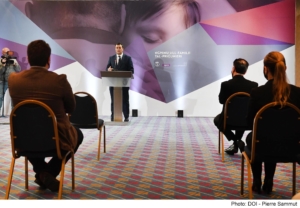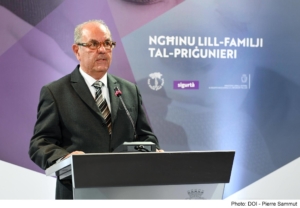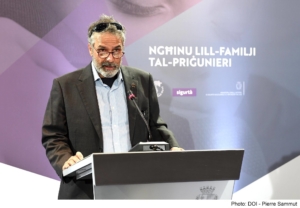Head of a prisoners’ self-help group, often in the line of fire from the Maltese Church, Fr Mark Montebello thrives under pressure and criticism. Mario Schembri Wismayer delves deep into this complex person in an effort to understand him.
A monk
I ask how long Fr Montebello has been a monk. “I entered in 1980 at 16. I was always close to the Dominicans. In 1989 I graduated and went toRome. That period of my life was uneventful.” I ask Fr Montebello why he chose the Dominican Order. “My family was close to the Dominicans of Sliema. To me it was an obvious choice. I used to know them personally.” So when did he realise that he had a vocation? “Certain things used to preoccupy me. A lot of youths used to gather on the Sliema front in those days. I used to consider them to be sheep without a shepherd and I used to wish to help them. Then I started to spend weekends with the priests. One clue was that I did not like it when it was time to leave them. One takes care of one’s affairs; you avoid relationships and you study in order to join. I was always fascinated by the idea of giving all my time and commitment to Jesus.”
Mid-Dlam ghad-Dawl
What caused him to set up Mid-Dlam ghad-Dawl? “Actually it was the prisoners who se t it up in 1995. When the two main ones left prison they asked me to help them. I freely accepted. I did not set it up. I was introduced to it. The prisoners called it by the name it has. So as a group coming from the roots I thought it was worth giving it my all. Today it includes volunteers, families and others. It started in 1995 at the time of Jim Roland – he was head of the prison. He was experimenting and the prisoners set up this group while he was head. Other self help groups which started at the time have finished.” I ask what the main functions of the group are. “The main functions are that of being a partner with the authorities and justice administrators – we work alongside them for the improvement of justice inMalta. We are a group of professionals. We provide advice and support in improving the structures of the penal system. We are an uncompromising enemy of criminality – be it large or small, but we are also an untiring defender of the prisoners’ future possibility to become a normal citizen. Whatever we do it is to safeguard that possibility.” How many people are involved in running this organisation? “I don’t work with large numbers. We have a fixed set of people. We share our lives and form each other through the help of the prisoners.”
Wording with prisoners
I ask Fr Montebello to explain further. “Formation means instruction in the system as well as in the humanity of the movement. We train to look at the person behind the prisoner. What we really look at is the beauty within; what once was and what may be again one day. That needs a lot of faith, study and sharing. We let the prisoner change us; we change the way we see things like justice, crime and persons. The prisoner is our catalyst of change. We all train ourselves in this spirituality. It is all about learning how to distinguish between the sinner and the sin. There is what you do and there is what you are. We condemn the sin but understand and assist the sinner. The bigger the sin, the bigger the sinner, and the bigger our mercy. We are 17 committed persons, most of them professionals within the correctional system. We do have contact with the actual wardens but it is illegal for the wardens to be part of this group. Most have a degree in the social sciences, but there are others – managers, an IT expert…”
Society’s criticism
I ask Fr Mark for his reaction to people who say that prisoners are paying their just desserts and that nothing extra should be done to help them. “The most unfortunate thing that could happen to society and to the actual and future potential victims, is that a person leaves prison worse than when he entered it and that is what is happening. Prison should be at the service of society. People should pay their dues, but it should not only be a place of punishment but also a place of therapy, where people are healed from the causes of crime. Actually people who say that there should be no help are illogical because they say they want to benefit society, but simple incarceration is not beneficial to society; it is making things worse. So when we defend the possibility of a prisoner to live happily and uphold the laws of the land, we are actually contributing to the benefit of society.”
Giving chances
I ask the monk if he believes in giving people a second chance. “I believe in giving real chances, that is, all round help. For instance, when a magistrate gives a person a probation order, without any help whatsoever to him or his family, it is impossible that that person benefits from that probation. It is a question of giving a real chance. Today we have prisoners who unfortunately cannot be helped if not with the greatest of efforts. These are mature men, moulded by the system itself. If there were only those we would help them, but there are so many people who can be helped and who have a real chance of changing that we have to focus on them.”
Society’s share
I ask what proportion of a criminal’s blame can be placed on the doorstep of society. The word society is a little too vague; it includes too much. The common people are not responsible for housing or employment. On the other hand, some people may help; employers may be more sensitive to ex-prisoners and the problems they meet on the place of work. These people tend to get the blame for everything. We had many cases where when people are asked for their criminal records after their probation period, they usually leave the next day because they assume that they are not going to be engaged. When we talk about society helping, we must include the prison itself, government, which does not, in principle, employ ex-convicts, which is a great scandal, the unions, the employers. The ETC does help out these prisoners and this is commendable. They have training programmes.”
Apology
In the past Mid-Dlam ghad-Dawl and myself have appeared to be very demanding. And that gave the impression that we’re very critical about what the government tries to do in this field. Sometimes I myself used very sharp words in this regard. I realise, now, that we did not appreciate enough the difficulties involved in bringing forward certain reforms. I realise this now, and I would like to apologise to anyone who may have been hurt by undue criticism.
We thought that people might have moved faster. We thought that our particular point of view would have been understood. But I do realise now that it is not easy to understand, and I do acknowledge that. I would like to provoke your readers to understand that as Christians we should try to understand what Jesus meant when he said: “Love your enemies”, which is a very profound and provoking statement which I think is absolutely true.
Difficult cases
I ask how Fr Montebello would deal with a paedophile or a serial killer? “Without specialised help little can be done. Giving people prison sentences and nothing else, cannot help; the greater the illness the more drastic the cure has to be. You don’t throw a sick person into bed without giving a cure – you can’t expect him to cure himself. You can’t expect a child molester to go to prison for three years and come out cured; that’s idiotic, actually. Admittedly, these are the most difficult questions. Paedophilia is still not really understood scientifically and this makes helping out more difficult.”
Study abroad
I ask if Fr Montebello studied abroad. “I studied inRomewhere I read philosophy – Plato – and inMadridwhere I studied Aristotle. I also studied ecclesiology in Brazil” I ask if he is influenced by the writings and teachings of anybody in particular “There is a branch of philosophy that we call personalism – I adhere to this ideology – that the human person is the most basic- the foundation stone of all that we call reality. Everything is a construct of the mind and that is the fundamental of everything. The human person is the centre of all consideration. If you change the constructs, you can change everything.”
Clash with the Church
I bring up a controversial subject. I point out that in the past Fr Montebello had fallen foul of the Church authorities. I ask him to mention the incidents that brought about this state of affairs. “We have different ecclesiologies – we understand the Church differently. The authorities inMaltaproject a monolithic Church – there is one way of being catholic; anything else is heresy or apostasy. I say that this is not true; for example, the recent manifesto of Alternattiva Demokratika, called for those who co-habit to be given certain rights. The Church said this should not be. As if this is the only opinion of the Church! Abroad the Church has certain pastoral attitudes to people who live like this. InMaltathe monolithic Church is somewhat intolerant. Another example would be the Church’s attitude towards homosexuals. It is not a question of doctrine but of politics. It is not a question of doctrine.”
What happened
I make sure that I am understanding him by distinguishing between the monk’s reservations about what is morally wrong and how the Church reacts to what is wrong. I ask Fr Mark if he disagrees with the Church when it is a question of doctrine “Of course not” So he only disagrees on the basis of how to react? “Exactly.” Harking back to the original cause, I ask Fr Montebello to tell me what happened. “It was a series of programmes on the then Live FM. The first set of programmes was called “The Truth will set us free”. It dealt with morals and religious subjects. That was stopped and I began another programme which was called ‘The strength of the will’ which was basically philosophy and that was stopped too. After that there was the ban of a year.”
Reaction
I ask how Fr Montebello reacted to this, as a person. “It follows very logically with what the Church inMaltathinks itself to be. The same problem was created last year when I published a book about Maltese philosophy. Again the Church objected on some items, especially where the book touched upon religion in very lay terms. You have a clash of two models of the Church.” I ask how come the priest embraced this very different model “First when I was still inMalta– it was a decision I took for saying the truth – to be always saying the truth. Secondly I was influenced during a study visit toBrazilunder the tutorship of Fr John Xerri. But not only that. You need to see that every view is not exclusive and the fact that A is in opposition to B does not make one right and the other wrong; they can both be wrong or right.” I ask if this is only characteristic to theChurchofBrazil. “It began there. It is just another world view. That was the beginning of what later led to my assimilating certain outlooks. What worries me about the local Church is that it is making itself irrelevant. And sometimes because of its monolithic structure and understanding of itself it actually decides to exile itself. A case in point is the conscious abdication to involve itself meaningfully in the EU debate, simply because it does not see any other position where it is not forced to say ‘yes’ or ‘no’. It should not side with yes or no; it should side withMalta. This image of a wholesome monolith is very, very weak. The Church inMaltais one of the few institutions which can do a lot of good in this country and yet we are in this situation. I blame all this on the weak leadership of the Church“
I point out that under Gonzi the Church was more monolithic “Yes, but at least we knew where we were. I think that Gonzi had phases. There were times he was very social minded but then he was incensed personally against Mintoff. But the Church never understood Mintoff and Dimech – two great men of the century.“
A changing Church
Did Fr Montebello think that the role and relevance of the Church today has changed? “The Church still projects herself as the conscience of the people, which is absurd. Society has changed but the Church has failed to adapt. I think the Church inMaltastill has not come to terms with the Vatican Council. Its mentality is still Tridentine, after the Council of Trent model. Take, for example, the elaborate ceremonies. In a country which is corrupt; the innumerable masses said every day; how come they did not changeMalta? Something must be very wrong. The Synod is supposed to think things over; yet it’s nothing but a long drawn monotonous, futile exercise.” So what is your alternative. “The thing is that the Church isMaltais still very sacramental. It has to become prophetic. It is very sacramental and power oriented. Nobody seems to care. That is the irrelevance of the Church inMaltatoday.”
Why stay?
If Fr Montebello is so annoyed by the Church why remain in it? “I believe in the Church. I believe in Jesus and I don’t considerMaltato be the whole of the Catholic Church. In other words I see people suffering but the healing hand of the Church is withheld, unfortunately. I’m not saying that the Church inMaltadoes not do any good, but what is done is done despite the institutional set-up.” Changing subject I ask what in Fr Montebello’s opinion is so different with the Cottonera Project today rather than 1998? “I think things are worse now because the Cottonera project is uncontrollable. They are doing whatever they like. They are building higher than the bastions, blocking passage ways and the like. There is no respect to the architectonic character of Vittoriosa. We’ve got a monster in our midst and we have not got any say as to what’s being done. For instance in the name of the Cottonera project a valley at Kalkara is going to be destroyed. We’ll fight, but the voice of the people is not being heard. For the benefit of Cottonera they are trying to destroy a Valley! They actually say this – in the last press release the Planning Authority actually said “for the benefit of Cottonera!”
Dom Mintoff
What do you think of Mintoff? “My relationship with Mintoff is personal. I think that, like Emmanuel Dimech, he was one in a million and basically I would call him a sign of contradiction because he is a lot of things to many people – all things to all men. What I like is this contribution he is giving lately; at least we have another path, different from the no and the yes. Polarisation is bad because it corners people with no possibility of compromise or benefit.”
The European Union
I ask Fr Montebello for his opinion about the EU. “I thinkEuropeis still evolving – it is still unprepared within itself. Joining the EU now is joining something which is still in a process of elaboration. Our contribution to that evolution will be negligible. I think we should wait and see how things develop. Secondly I thinkEuropedoes not want us in but it does not want us out – it is afraid of us remaining out. Thirdly I believe very strongly in independence and self-determination, even on a personal basis. And I think that once we have this we should not lose it willingly. It’s idiotic to loose it willingly. Maybe that is why I did not get married!” but aren’t you married to your community, I ask? “Yes but self determination is not destroyed over here!” I ask for Fr Mark’s thumbnail analyses of the Malta Labour Party. “Like all institutions it has its defects. I think that Alfred Sant is very much misunderstood. He is a victim of outrageous negative propaganda from his opponents. He is blamed for things that he is not responsible for. Labour is not as bad as they say it is.” I ask for a thumbnail portrait of the Nationalist Party. “The Nationalist party did a lot of good to the country. However, today it has cornered itself into the dangerous position of either EU or nothing and I think that the art of politics lies in the skill of retaining opportunities and alternatives. So what happened here is, to put it simply, bad politics. They should never have become cornered. They should have worked on another alternative.” What about a third political force inMalta? ”No. I prefer the two party system, with all its disadvantages, I still think its better than a multi party parliament.”
Inspiration
From where do you derive inspiration? “Inspiration is a question of having serenity, internal strength and having the capability of seeing things. Letting things touch you profoundly. So two things; serenity and contact. The first comes from prayer, and from prayer alone, while the second from contact with the people; prisoners, colleagues and the people I meet.”
FACT FILE
BORN: 7.2.64 EDUCATED: St Albert the Great College, St Aloysius College, St Thomas Aquinas College, Faculty of Theology at Tal Virtu, University of Malta, Angelicum University (Rome), and Complutense University (Madrid) ORDAINED PRIEST: 14.7.1989 MAIN MILESTONES: October 25, 1980, joined the Order of Preachers (Dominicans); August 1987 went to study in Brazil; October 1992, moved to the Cottonera district. RELAXATION: Walking near the Kalkara Valley at midnight.
HOBBIES: Reading good novels; Kafka, Dostoevsky, Kierkegaard.










